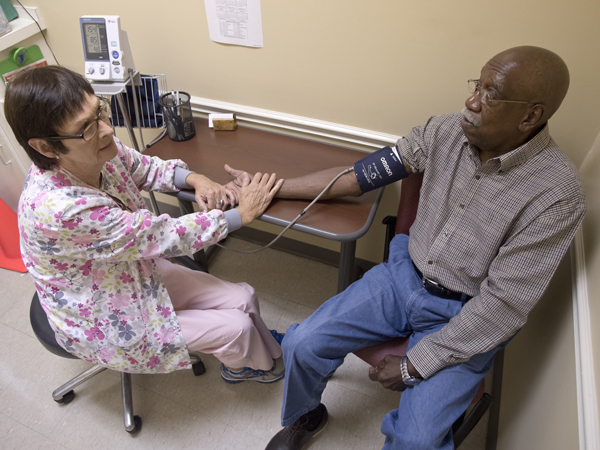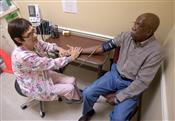Blood pressure: How low should you go?

University of Mississippi Medical Center hypertension specialist Dr. Zeb Henson works closely with patients whose dangerously high blood pressure puts them at risk of heart attack, stroke or other cardiovascular diseases.
Results from a national study released Friday based on data the Medical Center helped compile will make Henson's practice a little more challenging. The verdict: Current guidelines for goal blood pressure of 140/90 aren't low enough, and bringing it down to 120/80 or lower could reduce cardiovascular disease rates by almost a third, and the risk of death by almost a quarter.

Henson
"For a long time, we've known that someone with lower blood pressure naturally is going to have less risk for heart and kidney disease," said Henson, an associate professor of internal medicine, pediatrics and hypertension. "But if we treated the people with high blood pressure, we didn't really know how low we needed to go. It seems, at least for some people, the lower the better."
The study of 9,000-plus men and women over 50, called Systolic Blood Pressure Intervention Trial, or SPRINT, began in 2009 and was set to conclude in 2017, but officials with the National Heart, Lung and Blood Institute (NHLBI) decided to end the study early and announce results on Friday, saying the findings are potentially lifesaving and that revising the blood pressure guidelines could lower the death rate from heart attacks and stroke.
"Our results provide important evidence that treating blood pressure to a lower goal in older or high-risk patients can be beneficial and yield better health results overall," Lawrence Fine, M.D., chief of the Clinical Applications and Prevention Branch at NHLBI, said in a release from the National Institutes of Health. "But patients should talk to their doctor to determine whether this lower goal is best for their individual care."
UMMC is one of dozens of academic medical centers nationwide taking part in the study, said Dr. Marion Wofford, professor of internal medicine and hypertension and the Medical Center's principal investigator on the study before Henson assumed that role.

Granger
"It's critical for us to be involved," said Dr. Joey Granger, dean of the UMMC School of Graduate Studies in the Health Sciences. "We have first-hand knowledge of the importance of lowering blood pressure, and for our state's population, it's important to demonstrate how effective drug treatment can reduce the risk of cardiovascular disease."
The UMMC investigative team that includes clinical research manager Cathy Adair is studying 80 patients, all over 50 and all at risk of cardiovascular disease. Following the national study protocol, half were placed in a group whose blood pressure was being controlled by standard therapy, with a goal blood pressure of 140/90, Henson said. But the other half was given medications for a target blood pressure of 120/80.
They include Brandon resident Frank Tillman, whose hypertension has improved since he began taking part in the study four years ago. He's in the group with the goal blood pressure of 140/90. "It's helped me a lot," said Tillman, 73. "They recommended medicine that I got on, and they take your blood pressure three times when you come in to be checked. They want to keep it at a certain level."
All of the UMMC study participants are being seen at intervals for examinations, testing and lab work, Henson said. "We've been monitoring them for whether they develop heart, kidney or cardiovascular disease, and we've reported the outcomes to the study."
Nationally, one out of three adults cope with high blood pressure, and cardiovascular disease is the leading cause of death in the United States. Researchers see the study results as groundbreaking because a change in the current blood pressure guidelines could reduce overall mortality.
The findings will be front and center this week at a meeting in Washington, D.C. of the American Heart Association's Council on Hypertension Scientific Sessions, Granger said. He's chair of the association's scientific program committee and vice chair of the council.
"When I got the information on the study findings Friday, I thought, 'Wow! This is perfect prelude to this week's meeting,' " Granger said. "This is creating a lot of media buzz, and it highlights the importance of the research we are doing at UMMC, and that we are improving patients' lives and preventing deaths."
The study's impact "probably will change clinical practice," Henson said. "But, we need to be cautious and judicious before we reinvent the wheel on treatment, especially with older patients who tend to have more side effects from lower blood pressure. Dizziness and falls are what we are most worried about. When they fall, it's a lot different than when my 5-year-old falls."
The study's good news, Henson said, is that it gives the medical community more information. "The more information we have, the better care we can give our patients, knowing that going a little bit lower with blood pressure is probably safe, and probably will decrease the risk of cardiovascular disease over time," he said.
It means doctors and nurses must be excruciatingly accurate in checking blood pressure, he said. "If we don't and get a higher number than it actually is, we might place them on medicines based on a poor blood pressure measurement."
And, he said, it's often difficult to manage a patient's blood pressure to get it close to the current goal of 140/90. "If the goals change, that will be even harder," Henson said. "It will put an increased emphasis on lifestyle changes and diet."

Cushman (Photo courtesy: University of Tennessee Health Science Center)
Henson and Wofford join a number of top researchers nationally who didn't expect the trials would be stopped based on data gathered over just a few years. "I was very surprised not only by how large the effect was, but that it occurred at such a relatively early stage of the study," Dr. William C. Cushman, a 1974 University of Mississippi School of Medicine graduate and member of the trial leadership committee, told the New York Times. Cushman is chief of preventive medicine at the Veterans Affairs Medical Center in Memphis.
"It's hard to analyze this until we look at lots of other data points," Wofford said. "The findings we know now are for the entire population. But, perhaps there's a difference in patients with chronic kidney disease. Maybe there's a difference with the elderly."

Wofford
More complete study results are to be released in a couple of months, the National Heart, Lung and Blood Institute says. The Institute says another study facet - whether lower blood pressure can lead to a decrease in dementia - is still being analyzed. Tillman's part in the study also involves memory testing to gauge whether his blood pressure has a connection to his ability to remember.
Henson and Wofford believe all of the study data needs a close look. "It's very preliminary to make a conclusion until we have a better understanding of the data," Wofford said.
"This is creating a lot of media buzz, and it highlights the importance of the research we are doing at UMMC, and that we are improving patients' lives and preventing deaths," Granger said.
"We still have a lot more work to do. We have drugs to treat hypertension, but they're not the best that they can be," he said. "Hopefully, we can find a single drug to treat it without all the side effects."







